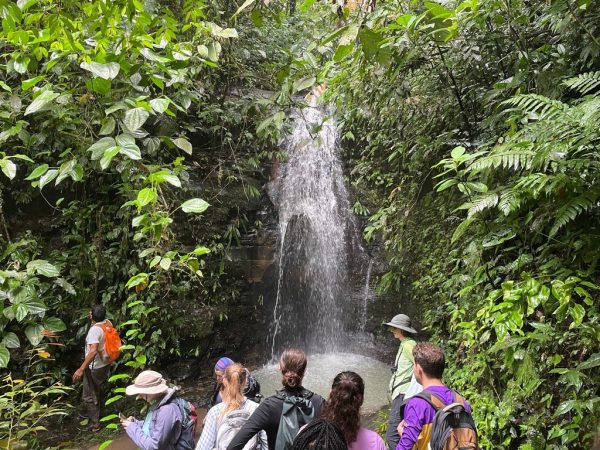Nearly two decades ago, the seeds of the Tulane Interdisciplinary Environmental Research and Action Program were planted.

The TIERA program is an innovative initiative that connects students to real-life conservation efforts in the Chocó Rainforest of Ecuador. Its development began in 2011 when Jordan Karubian, associate professor of ecology and evolutionary biology, and his wife Renata Durães Ribiero, professor of practice of ecology and evolutionary biology, began taking students to Ecuador for two-week field courses at a number of reserves.
Karubian has been doing research in Ecuador since 2003, many years before he joined the Tulane EEB department in 2010. During this time, he built deep relationships with local Ecuadorians with whom he eventually co-founded Fundación Para La Conservación de los Andes Tropicales Station in 2019. The FCAT station is a 1,500-acre “living laboratory” where students, researchers, locals and volunteers collaborate to conserve disappearing forests and the vast diversity of organisms living there through a number of research projects. The TIERA field course was officially established in the years following.
“[The founding of FCAT] was a real inflection point in the program, because then we started being able to bring students to FCAT and really…immerse in the FCAT experience and contribute to the FCAT programs,” Karubian said.
Students, alongside local Ecuadorians, engage in grassroots research and conservation in the Chocó Rainforest in Ecuador through the program.
Karubian says TIERA is appealing to a breadth of student interests, whether that be “biodiversity and saving endangered species… community-engaged research…international development or public health or water quality or history or law or business or economics.” This is one of the reasons the program is “so enriched.”
Over 30 majors are represented among the students who take the TIERA field course, and students can choose from several field courses when they apply, ranging from bird and insect ecology to reforestation to ecotourism business and marketing.
The benefit of the TIERA field course is threefold. Karubian explains that students get “hands-on experiential training” in a way they have likely never done before. Students in the field course can dive deep into a topic they are already interested in or explore something new, unrelated to what they are studying within their major. Either way, students “[gain] an appreciation and [are] able to talk and understand across disciplines,” Karubian said.
Finally, students are immersed in one of the main focuses of FCAT and the TIERA program: community-engaged research.
“FCAT does not exist as an organization to provide experiences to undergraduate students. FCAT exists as an organization to do real world change for and by local residents in Ecuador,” Karubian said. “Students have an opportunity to really see what that’s like from the inside out.”
Junior Meryl LaRue participated in the two-week TIERA program in 2023. She went on to apply and be accepted to the Scholars Track, a program in which a cohort of less than a dozen students stay at the FCAT station for nearly a month conducting individual independent research projects. The Scholars program is only open to students who have completed the TIERA field course and requires accepted students to complete a course in the spring semester before their visit to FCAT to prepare for the summer fieldwork. Afterwards, students synthesize a product from their research, like an honors thesis or poster.
During her time in the Scholars program, LaRue did field research on carbon sequestration and potential future carbons storage as a part of a larger forest restoration project at FCAT. She chose to continue onto the Scholars track because of her desire to go into conservation research and her experiences in the two-week field course.
“I really wanted to do something that could be helpful to FCAT in some way,” LaRue said. “[Conservation research was] not necessarily something that I had thought about before doing the TIERA program, but it’s definitely shifted my career goals.”
Her experience at FCAT is one she remembers fondly, and one that shifted not just her career goals but her mindset about conservation.
“Seeing how passionate everybody is about contributing to health and conservation and doing the work makes me super hopeful,” LaRue said. “It’s easy to look at the news and…feel sad or hopeless about conservation, but I think…TIERA has really made me feel like it’s possible to make a difference.”
One of the most memorable moments of her trips was meeting local Ecuadorian children who visit the station for FCAT’s community programming.
“Seeing how passionate all the kids were about…learning about the rainforest and conservation was really impactful for me. It was good to see that younger generations are also just as passionate about protecting the rainforest,” LaRue said.
Catie Mae Carey is the program coordinator for the TIERA program. She focuses on recruitment for the program and mentorship of students in the Scholars program. For the future of TIERA, she imagines a broadening of its scope and engagement with non-Tulane students.
“Continuing to have a relationship with [TIERA alumni] even after they graduate is a big picture goal for me, as well as increasing the amount of non-Tulane students that we have on the program, [and] eventually including Ecuadorian students,” Carey said. It would be “a mutually beneficial experience” for both Ecuadorian and American students at FCAT.
The application process for the TIERA program is straightforward and scholarships are available to cover the costs of participating. Students who participate earn three EBIO or EVST credits, and the program fulfills the math and natural sciences core requirement, the environmental studies methods requirement and the first or second tier public service requirement. Applications are due Feb. 24, and students can find more information on the application process here.


